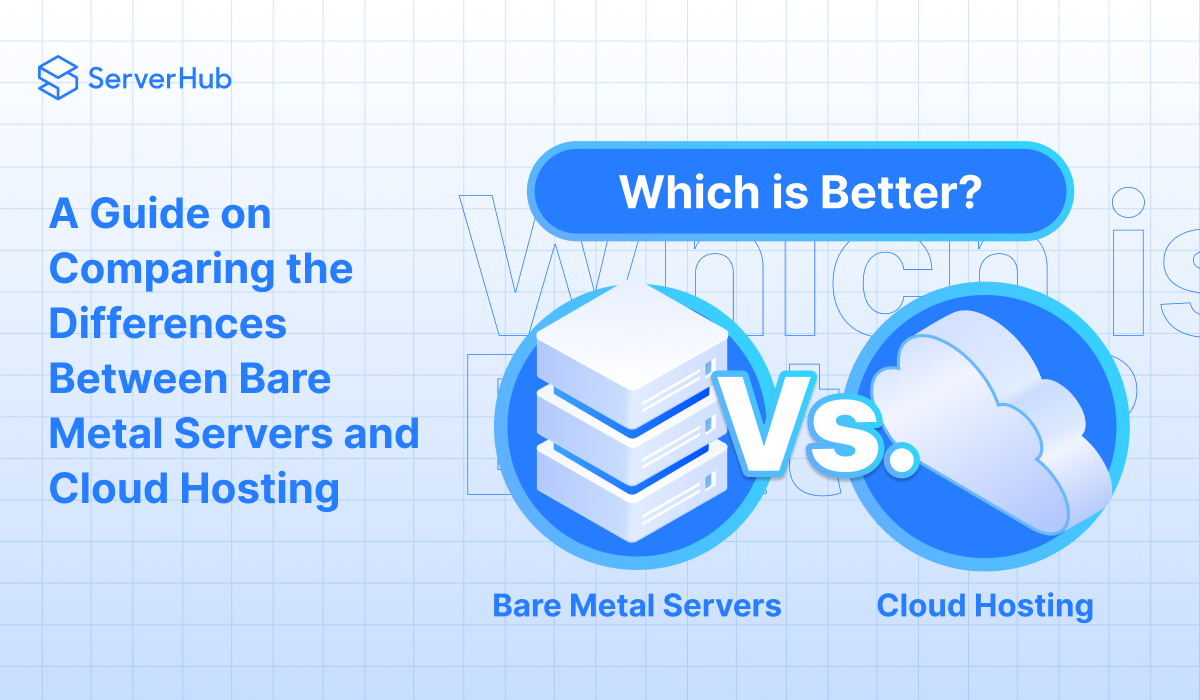In the world of computing and web hosting, businesses and individuals have multiple options when it comes to hosting their applications and websites. Two popular choices are bare metal servers and cloud hosting. Both options offer unique features and advantages, but understanding their specific meanings and applications is crucial for making an informed decision. In this article, we will explore the definitions, features, advantages, and differences between bare metal vs. cloud hosting to help you determine which option is better suited for your needs.
What are Bare Metal Servers and Cloud Hosting?
Bare metal servers, also known as dedicated servers, are physical servers that are leased or owned by a single client. These servers are not virtualized, which means the customer has exclusive access to all the hardware resources, including CPU, RAM, and storage. Bare metal servers are often used for resource-intensive applications, such as high-performance computing, big data analytics, and mission-critical workloads.
Cloud hosting refers to the delivery of computing resources, including storage, processing power, and software, over the Internet. Cloud hosting providers offer virtualized resources that are hosted on their infrastructure and can be scaled up or down as per the user's needs. Cloud hosting is often used for web applications, content delivery, and scalable workloads.
Bare Metal Servers vs. Cloud Hosting: Features and Advantages of Each Hosting Option
Bare Metal Servers:
1. Customization: Allows for extensive customization, enabling you to tailor the hardware and software configurations to meet your specific requirements.
2. Performance: Since users have exclusive access to the server’s resources, bare metal servers are ideal for computationally intensive workloads and provide optimal performance for high-load applications.
3. Security: Users have full control over security configurations. This makes it easier to implement customized security measures and comply with specific data protection regulations.
4. Cost-effectiveness: This can be cost-effective for long-term projects or applications with high-resource utilization, as bare metal servers don't incur the added costs associated with virtualization layers.
Cloud Hosting:
1. Scalability: Allows users to easily adjust resources up or down based on traffic spikes or changing demands. This scalability is advantageous for businesses undergoing rapid growth or seasonal variations.
2. Reliability: Cloud hosting providers usually offer redundant infrastructure and automated failover mechanisms. This minimizes downtime and ensures high availability and uptime.
3. Cost-efficiency: Typically operates under a pay-as-you-go model, where users only pay for the resources that they consume. This allows for cost optimization and eliminates upfront investments in hardware.
4. Accessibility: Cloud-based resources can be accessed from anywhere with an Internet connection, enabling remote collaboration and seamless access.
Bare Metal Servers vs. Cloud Hosting: Comparisons and Differences
When evaluating between bare metal and cloud hosting, several key differences and comparisons stand out:
* Resource allocation:
a. Bare metal servers: Dedicated hardware resources for exclusive use.
b. Cloud hosting: Shared resources across multiple users with virtualized allocation.
* Scalability:
a. Bare metal servers: Limited scalability due to physical hardware constraints.
b. Cloud hosting: Highly scalable, with the ability to easily adjust resources on-demand.
* Upfront costs:
a. Bare metal servers: Higher upfront costs for hardware acquisition and maintenance.
b. Cloud hosting: Lower upfront costs, with a pay-as-you-go pricing model.
* Control and customization:
a. Bare metal servers: Greater control and customization options for hardware and software configurations.
b. Cloud hosting: Limited control and customization, as resources are managed by the hosting provider.
* Security and compliance:
a. Bare metal servers: Potentially higher security and compliance due to dedicated physical resources.
b. Cloud hosting: Shared infrastructure may pose security concerns. However, the hosting providers offer robust security measures.
* Deployment speed:
a. Bare metal servers: Longer deployment times due to physical setup and configuration.
b. Cloud hosting: Limited customization, often confined to pre-configured virtual instances.
* Maintenance and management:
a. Bare metal servers: Requires in-house management or third-party managed services.
b. Cloud hosting: Managed by the hosting provider, which reduces the burden on the customer’s in-house IT staff.
Choosing Between Bare Metal Servers and Cloud Hosting
To conclude, when deciding between bare metal vs. cloud hosting for your requirements, you should consider the following factors:
1. Budget considerations: Evaluate the upfront and ongoing costs associated with each option. Consider your budget limits and cost optimization strategies.
2. Control and customization: Assess the level of control and customization you need over your hardware and software configurations.
3. Scalability needs: Consider the potential growth of your business and its need for scalability and flexibility in the allocation of resources.
4. Workload requirements: Evaluate the nature of your business workloads, including their computational demands, performance requirements, and scalability needs.
5. Security concerns: Determine the security and compliance needs of your websites, applications, and data. Choose the hosting option that best aligns with your security needs.
6. Performance requirements: If your applications need consistent and predictable performance, bare metal servers may be the best option. However, if scalability and flexibility are crucial, cloud hosting may offer more advantages.
7. Management capabilities: Determine if you have the resources to manage the server infrastructure yourself under a bare metal setup, or if you prefer the provider-managed services offered by cloud hosting.
Ultimately, both bare metal servers and cloud hosting have their distinct advantages and are suited for different scenarios. By understanding your specific needs and comparing the critical aspects of each, you can make an informed decision that will support your specific requirements, priorities, and long-term goals.
Bare Metal Servers and Cloud Hosting from ServerHub
ServerHub offers unparalleled performance with its bleeding-edge bare metal servers and cloud hosting services. Our bare metal servers are powered by the latest Intel Xeon Enterprise Processors with top-tier memory from Kingston and Samsung. ServerHub’s cloud hosting solutions deliver scalability, flexibility, and cost-effectiveness for businesses of all sizes. Contact us now to experience our high-performance bare metal servers or agile cloud resources and let us become partners in your company’s innovation and growth.
